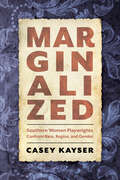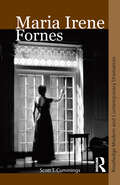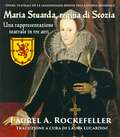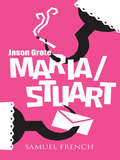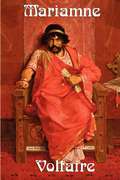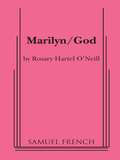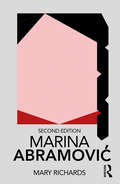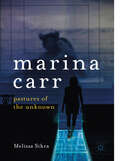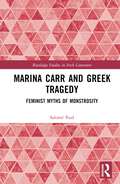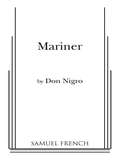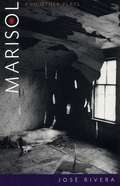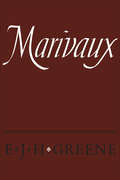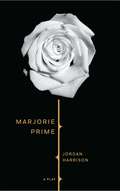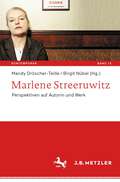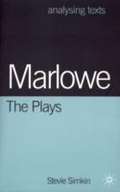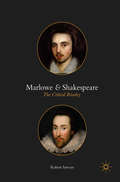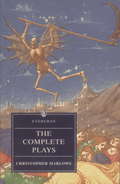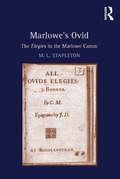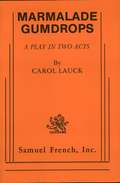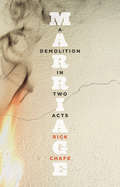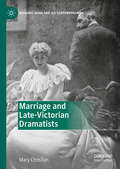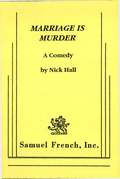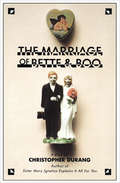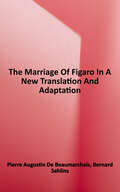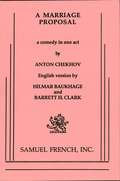- Table View
- List View
Marginalized: Southern Women Playwrights Confront Race, Region, and Gender
by Casey KayserWinner of the 2021 Eudora Welty PrizeIn contrast to other literary genres, drama has received little attention in southern studies, and women playwrights in general receive less recognition than their male counterparts. In Marginalized: Southern Women Playwrights Confront Race, Region, and Gender, author Casey Kayser addresses these gaps by examining the work of southern women playwrights, making the argument that representations of the American South on stage are complicated by difficulties of identity, genre, and region. Through analysis of the dramatic texts, the rhetoric of reviews of productions, as well as what the playwrights themselves have said about their plays and productions, Kayser delineates these challenges and argues that playwrights draw on various conscious strategies in response. These strategies, evident in the work of such playwrights as Pearl Cleage, Sandra Deer, Lillian Hellman, Beth Henley, Marsha Norman, and Shay Youngblood, provide them with the opportunity to lead audiences to reconsider monolithic understandings of northern and southern regions and, ultimately, create new visions of the South.
Maria Irene Fornes (Routledge Modern and Contemporary Dramatists)
by Scott T. CummingsMaria Irene Fornes is the most influential female American dramatist of the 20th century. That is the argument of this important new study, the first to assess Fornes's complete body of work. Scott T. Cummings considers comic sketches, opera libretti and unpublished pieces, as well as her best-known plays, in order to trace the evolution of her dramaturgy from the whimsical Off-Off Broadway plays of the 1960s to the sober, meditative work of the 1990s. The book also reflects on her practice as an inspirational teacher of playwriting and the primary director of her own plays. Drawing on the latest scholarship and his own personal research and interviews with Fornes over two decades, Cummings examines Fornes's unique significance and outlines strategies for understanding her fragmentary, enigmatic, highly demanding theater.
Maria Stuarda, regina di Scozia: una rappresentazione teatrale in tre atti
by Laura Lucardini Laurel A. RockefellerLa tragica storia della regina Maria Stuarda diventa un'opera teatrale in questa coinvolgente tragedia che ne racconta la vita, gli amori e il regno. Un'opera perfetta per le scuole e le compagnie amatoriali. Include bibliografia e cronologia degli eventi. Durata: 60-80 minuti.
Maria/Stuart
by Jason GroteCharacters: 1 male, 5 femaleMultiple Sets Up-and-coming cartoonist Stuart fights to keep the lid on his mother's and aunts' simmering angst. But the family's secrets channel themselves into a bizarre shapeshifter that guzzles soda, communicates by fax, and spouts old German verse. Friedrich Schiller's classic tale of warring queens inspires this gothic romp through the weirder side of suburban America. "Grote has made a name for himself in recent years with scripts that explode the boundaries between the ordinary and the chimerical, the political and the aesthetic, the intimate and the dizzyingly cosmic."- Washington Post "An ingenious tale, and mined with offbeat, explosive devices." - Seattle Times "Maria/Stuart, by Brooklyn-based playwright Jason Grote, is a cleverly built, well-concealed pit trap. At first, the play seems like a pleasant stroll through a family of comical, middle-class eccentrics-in just a few steps, it plunges into a dark subterranean maze...Here's hoping this isn't the last we'll see of Jason Grote." -The Stranger "Written in true Grote form, Maria/Stuart explores-and redefines-the boundaries between reality and fantasy, ordinary and bizarre, chaos and normality. It's also darkly comical, witty and relevant."-Twin Cities Metro "Absolutely astonishing. Tremendous writing, incredible acting. And laughs. Big laughs." - DC Theatre Scene "Crazily entertaining comedy...surreal, witty, expertly performed. Maria/Stuart is a mélange of intense, ludicrous, silly, common-garden-variety family hell. It is more than enough for a great night out at the theater." -MetroWeekly
Mariamne
by VoltaireIt is enough: the power of Salome, By all acknowledged, and by all obeyed, On its firm basis stands immovable: I fled to Azor, with the lightning's speed, Even from Samaria's plain to Jordan's spring, And quick returned: my presence there indeed Was needful, to cut off the aspiring hopes Of Israel's moody race: thy brother Herod, So long detained at Rome, was almost grown A stranger in his kingdom; and the people, Ever capricious, turbulent, and bold, Still to their kings unjust, aloud proclaimed, That Herod was condemned to slavery By haughty Rome; and Mariamne, raised To the high rank of her proud ancestors, Would from the blood of our high-priests select A king, to rule o'er conquered Palestine. Wilder Publications is a green publisher. All of our books are printed to order. This reduces waste and helps us keep prices low while greatly reducing our impact on the environment.
Marilyn/God
by Rosary Hartel O'NeillCharacter: 1 femaleIn this play, Marilyn confronts voices in her head to validate her life as an actress. She finds in the afterlife that she must audition and interview to get into heaven and that her judges are her enemies and aborted children. Along the way she is confused and intrigued by the signs she must follow to climb her way into heaven. The play explores the multi-levels of complexity of cult goddess Marilyn Monroe--her vulnerability, anger, and loneliness and the ways that American culture and the worship of beauty and fame shaped, aborted and forwarded her rise to stardom. In the afterlife she relives three painful scenes from her life and a life review and strains to justify her choices to male unsympathetic judges as well as shocking people from her past.
Marina Abramović (Routledge Performance Practitioners)
by Mary RichardsMarina Abramović is the creator of pioneering performance art which transcends the form’s provocative origins. Her visceral and extreme performances have tested the limits of both body and mind, communicating with audiences worldwide on a personal and political level. Updated and revised throughout, the book combines: a biography, setting out the contexts of Abramović’s work an examination of the artist through her writings, interviews and influences a detailed analysis of her work, including studies of the Rhythm series, Nightsea Crossing and 512 Hours practical explorations of the performances and their origins. As a first step towards critical understanding, and as an initial exploration before going on to further, primary research, Routledge Performance Practitioners offer unbeatable value for today’s student.
Marina Carr: Pastures of the Unknown
by Melissa SihraThis book locates the theatre of Marina Carr within a female genealogy that revises the patriarchal origins of modern Irish drama. The creative vision of Lady Augusta Gregory underpins the analysis of Carr’s dramatic vision throughout the volume in order to re-situate the woman artist as central to Irish theatre. For Carr, ‘writing is more about the things you cannot understand than the things you can’, and her evocation of ‘pastures of the unknown’ forms the thematic through-line of this work. Lady Gregory’s plays offer an intuitive lineage with Carr which can be identified in their use of language, myth, landscape, women, the transformative power of storytelling and infinite energies of nature and the Otherworld. This book reconnects the severed bridge between Carr and Gregory in order to acknowledge a foundational status for all women in Irish theatre.
Marina Carr and Greek Tragedy: Feminist Myths of Monstrosity (Routledge Studies in Irish Literature)
by Salomé PaulMarina Carr and Greek Tragedy examines the feminist transposition of Greek tragedy in the theatre of the contemporary Irish dramatist Marina Carr. Through a comparison of the plays based on classical drama with their ancient models, it investigates Carr’s transformation not only of the narrative but also of the form of Greek tragedy. As a religious and political institution of the 5th-century Athenian democracy, tragedy endorsed the sexist oppression of women. Indeed, the construction of female characters in Greek tragedy was entirely disconnected from the experience of womanhood lived by real women in order to embody the patriarchal values of Athenian democracy. Whether praised for their passivity or demonized for showing unnatural agency and subjectivity, women in Greek tragedy were conceived to (re)assert the supremacy of men. Carr’s theatre stands in stark opposition to such a purpose. Focusing on women’s struggle to achieve agency and subjectivity in a male-dominated world, her plays show the diversity of experiencing womanhood and sexist oppression in the Republic of Ireland, and the Western societies more generally. Yet, Carr’s enduring conversation with the classics in her theatre demonstrates the feminist willingness to alter the founding myths of Western civilisation to advocate for gender equality.
Mariner
by Don NigroThis wild epic celebrates the mad obsession and ambiguous triumph of Christopher Columbus. The charming Italian mariner and lover moves through the nightmare of his life, loves and struggles against authority and stupidity, confronting the wondrous and terrible fruits of his obsession. He is brought to judgment before the inquisition for the sins of lechery and pride. Kings, queens, mermaids, dead sailors, lovers, princes, fools and even madhouse inhabitants haunt and taunt the compromised hero. This play, commissioned for the 500th anniversary of Columbus's first voyage, is rich in language, action, character and humor as it explores the consequences of exploration, discovery, madness and creation.
Marisol and Other Plays
by José RiveraThe first collection of plays by one of the most moving and astonishing writers of the last 15 years. Though critics reflexively class his work as "magical realism," Rivera's extravagant, original imagery always serves to illuminate the gritty realities and touching longings of our daily lives. Also includes: Each Day Dies with Sleep and Cloud Tectonics.
Marivaux
by E. J. GreeneThe last thirty years have seen a renewed interest in the novels, plays, and essays of Marivaux. Each year more of his work is made available to the public in partial editions. More and better studies have appeared, superseding the old and, in the last thirty years, almost all of his plays have been performed. Today no corder of his work remains unexplored: our knowledge of his life, which had been until recently a tissue of fancy and anecdote, has been enhanced by the discovery of a few facts. This critical study of the entire body of Marviaux's writings sets out to tell whether this attention represents a securely established place for Marivaux among the great French writers, or simply a vogue. It consists of a careful analysis of the individual works, in chronological order rather than in systematic groups, as is customary, showing the development of Marivaux's thinking, and the intimate relationship among the plays, novels, and essays of any given period. A history of the reception of the works, by scholars and critics from Marivaux's time to the present, presents succinctly the historical perspective through which the modern reader may understand the long indifference to Marivaux in France and his contemporary "discovery." Professor Greene's work will be of great value to all students of the eighteenth century in France. Because of his lively interest in the theatre arts it will also be valuable for directors planning to produce the plays of Marivaux.
Marjorie Prime (TCG Edition)
by Jordan Harrison"A thought-provoking play about memory, its corruption and our insistence that technology help us outwit death."—The New York Times "It's the kind of experience that keeps unfolding in the mind long after the play is over."—Los Angeles TimesIn a future not far from our present, Marjorie spends her time rewriting her past in favor of her idealized memories, with help from the intriguingly innovative technology that allows her to do so. With deeply felt characters – both real and in the form of holograms or "Primes"—Jordan Harrison's widely acclaimed new play burrows into the most troubling questions of the digital age: are we replacing our memory with a false reality, and what does that mean about the preservation of the truth? Marjorie Prime ultimately asks whether manipulating our past is a corruption of history or a welcome consolation. Jordan Harrison's other plays include Maple and Vine, Doris to Darlene, Amazons and their Men, Act a Lady, Finn in the Underworld, Futura, Kid-Simple, The Museum Play, Standing on Ceremony, Suprema, and Fit for Feet. His children's musical, The Flea and the Professor, won the 2011 Barrymore Award for Best Production. Harrison is the recipient of a Guggenheim Fellowship, a Hodder Fellowship at Princeton University, a Theater Masters' Innovative Playwright Award, the Kesselring Prize, the Heideman Award, the Loewe Award for Musical Theater, Jerome and McKnight Fellowships from The Playwrights' Center, and a NEA/TCG Playwright-in-Residence Grant.
Marlene Streeruwitz: Perspektiven auf Autorin und Werk (Kontemporär. Schriften zur deutschsprachigen Gegenwartsliteratur #12)
by Mandy Dröscher-Teille Birgit NübelMarlene Streeruwitz ist eine der streitbarsten politischen Autor*innen der Gegenwart. Literatur ist ihr nicht nur politisches Instrument, sondern als »Modell der Welt in Sprache« zugleich auch ästhetisch autonom. Die Beiträge dieses Bandes diskutieren die Weiterschreibungen, Gegen- und Neukonstruktionen der außertextuellen Welt in den Prosatexten, Essays, Vorlesungen und crossmedialen Projekten der Autorin. In den Blick genommen wird das Welt- und Lebenswissen der Literatur, ihr Beitrag zu unserer Trauer und Resistenz, Erinnerungs- und Überlebensfähigkeit – zwischen Glück, Lust, Liebe, (Für )Sorge und Schmerz. Marlene Streeruwitz trägt – neben einem Gespräch mit den beiden Herausgeberinnen – einen Originalbeitrag sowie einen bisher ungedruckten poetologischen Essay zum Band bei.
Marlowe: The Plays
by Stevie SimkinChristopher Marlowe was the most successful dramatist of his time, his untimely death cutting short a career that may well have rivalled Shakespeare's. His four major works (Doctor Faustus, Edward II, The Jew of Malta and Tamburlaine) are remarkable pieces of theatre, daring explorations of themes such as the nature of kingship, salvation and damnation, sexuality and ethnic prejudice. This book looks in depth at extracts from each of the plays, exploring them in parallel to uncover key concerns, including heroes and anti-heroes, gender and power and politics. As well as guiding readers in an understanding of the place of these issues in their Elizabethan context, and inviting them to consider their resonance today, the book looks in depth at Marlowe's style: his use of rhythm, the complexities and richness of his poetry, and his evolving development of 'character'. Particular attention is given throughout to the plays in performance.
Marlowe and Shakespeare
by Robert SawyerInstead of asserting any alleged rivalry between Marlowe and Shakespeare, Sawyer examines the literary reception of the two when the writers are placed in tandem during critical discourse or artistic production. Focusing on specific examples from the last 400 years, the study begins with Robert Greene's comments in 1592 and ends with the post-9/11 and 7/7 era. The study not only looks at literary critics and their assessments, but also at playwrights such as Aphra Behn, novelists such as Anthony Burgess, and late twentieth-century movie and theatre directors. The work concludes by showing how the most recent outbreak of Marlowe as Shakespeare's ghostwriter accelerates due to a climate of conspiracy, including "belief echoes," which presently permeate our cultural and critical discourse.
Marlowe: Complete Plays
by Christopher MarloweTheir texts fully restored by recent scholarship, Marlowe's astonishing works can now be appreciated as originally written. For the first time, this edition boasts the complete plays - including two versions of Doctor Faustus.Blasphemy, perversion, defiance and transgression ... in a series of compelling tragedies, Marlowe challenged every authority of heaven and earth. From the proud wrath of Tamburlaine, the tyrant of Asia, to the racked anguish of Edward II, himself in thrall to unspeakable desires; from God's own Machiavel, the Duke of Guise, to Barabas, the Jew of Malta, curse of Christianity: all are taboo-breakers, to be broken in their turn. And in the tragedy of Doctor Faustus we perhaps read Marlowe's own: a tale of brilliance and audacity - and of terrible, inexorable punishment.Their texts fully restored by recent scholarship, Marlowe's astonishing works can now be appreciated as originally written. For the first time, this edition boasts the complete plays - including two versions of Doctor Faustus.
Marlowe's Ovid: The Elegies in the Marlowe Canon
by M. L. StapletonThe first book of its kind, Marlowe's Ovid explores and analyzes in depth the relationship between the Elegies-Marlowe's translation of Ovid's Amores-and Marlowe's own dramatic and poetic works. Stapleton carefully considers Marlowe's Elegies in the context of his seven known dramatic works and his epyllion, Hero and Leander, and offers a different way to read Marlowe. Stapleton employs Marlowe's rendition of the Amores as a way to read his seven dramatic productions and his narrative poetry while engaging with previous scholarship devoted to the accuracy of the translation and to bibliographical issues. The author focuses on four main principles: the intertextual relationship of the Elegies to the rest of the author's canon; its reflection of the influence of Erasmian humanist pedagogy, imitatio and aemulatio; its status as the standard English Amores until the Glorious Revolution, part of the larger phenomenon of pan-European Renaissance Ovidianism; its participation in the genre of the sonnet sequence. He explores how translating the Amores into the Elegies profited Marlowe as a writer, a kind of literary archaeology that explains why he may have commenced such an undertaking. Marlowe's Ovid adds to the body of scholarly work in a number of subfields, including classical influences in English literature, translation, sexuality in literature, early modern poetry and drama, and Marlowe and his milieu.
Marmalade Gumdrops
by Carol LauckFantasy / 3m, 4f / Interior / Explores the imaginative world of 10 year old Walter K. Hampton. The play is simply set with actors as furniture in Wally's bedroom, yet moves swiftly through delightful experiences with wind up dolls, and old fashioned melodrama, a circus, story telling, and even a time machine. Led through fun filled antics by Governor Winthrop, his gumdrop popping desk, Libby Bibliophile, his instructive bookcase, Clair Beam, his not too bright lamp, Bedelia Cotter, his yawning bed, and Windsor, his stuffy chair, Wally concludes that, "Imagination is like a marmalade gumdrop; once you've tasted it, you'll never settle for just plain."
Marriage: A Demolition in Two Acts
by Rick ChafePut away the knives because tensions are rising in this kitchen renovation. What could help patch up a marriage better than a home renovation? Wayne thinks he’s doing his wife Julie a favour by hiring a young couple to help redo the kitchen (at a fraction of the cost she’d hoped for). But Julie has higher standards in mind. John and Maggie think they’ve found a way to make some quick money to pay off the land John bought. John just proposed, but Maggie hasn’t given her answer yet. With both couples on edge amongst themselves and with each other, everything from kitchen cabinets and coffee makers to generational differences and life choices are cause for ridicule, making a play that’s hilarious and relatable.
Marriage and Late-Victorian Dramatists (Bernard Shaw and His Contemporaries)
by Mary ChristianThis book examines plays produced in England in the 1890s and early 1900s and the ways in which these plays responded to changing perceptions of marriage. Bernard Shaw, Oscar Wilde, and other late-Victorian dramatists challenged romanticized ideals of love and domesticity, and, in the process, these authors appropriated and rewrote the genre conventions that had dominated English drama for much of the nineteenth century. In their plays, theater became a forum for debating the problems of traditional marriage and envisioning alternative forms of partnership. This book is written for scholars specializing in the areas of Victorian studies, dramatic literature, theater history, performance studies, and gender studies.
Marriage Is Murder
by Nick HallComedy / 1m, 1f / Interior / Ex-spouses Paul and Polly Butler write murder mysteries together. They act out the crimes in Paul's apartment: poisoned chocolates and lethal martinis, alibis and fingerprints, bodies in a trunk and bodies all tied up, daggers, guns and even an axe all contribute to the hilarity. Nobody gets hurt, but their egos take some hits as they find that their marriage was mixed up with their work. There are many fast paced comic twists as they attempt to outdo and surprise each other and they learn that marriage, like murder, is in the details. The final witty complication is a real murder which they and the audience should have seen coming. This murderously funny two character comedy is by the author of Accommodations.
The Marriage of Bette and Boo (Books That Changed the World)
by Christopher DurangA painfully funny, Obie Award-winning play about the tragedy and comedy of family life.Never have marriage and the family been more scathingly or hilariously savaged than in this brilliant black comedy. The Marriage of Bette and Boo brings together two of the maddest families in creation in a portrait album of life’s uncertainties and confusion. Bereaved by miscarriages, undermined by their families, separated by alcoholism, assaulted by disease, and mystified by their priest, Bette and Boo, in their bewildered attempts to provide a semblance of hearth and home, are portrayed with a poignant compassion that enriches and enlarges the play, and makes clear why Christopher Durang has become one of the great names in American theater.“One of the most explosively funny American dramatists.”—Newsweek
The Marriage of Figaro: In a New Translation and Adapation
by Pierre A. De BeaumarchaisSensual gaiety is at the heart of this comic masterpiece which continues the merry tale of the little barber of Seville, a clever common man whose wits overcome his superiors who would suppress him. In paring down the number of players, presenting the scenes more economically, and offering a translation that removes archaic phrasing, Mr. Sahlins delivers a script that can be comfortably staged by present-day theatres.
Marriage Proposal (Clark)
by Anton ChekhovShort plays, farce / 2m, 1 f / Interior / Mod. or Russian cost. This little farce is very popular and one of the funniest ever written. The story tells of the efforts of a nervous and excitable man who starts to propose to an attractive young woman, but who gets into a tremendous quarrel over a boundary line.
